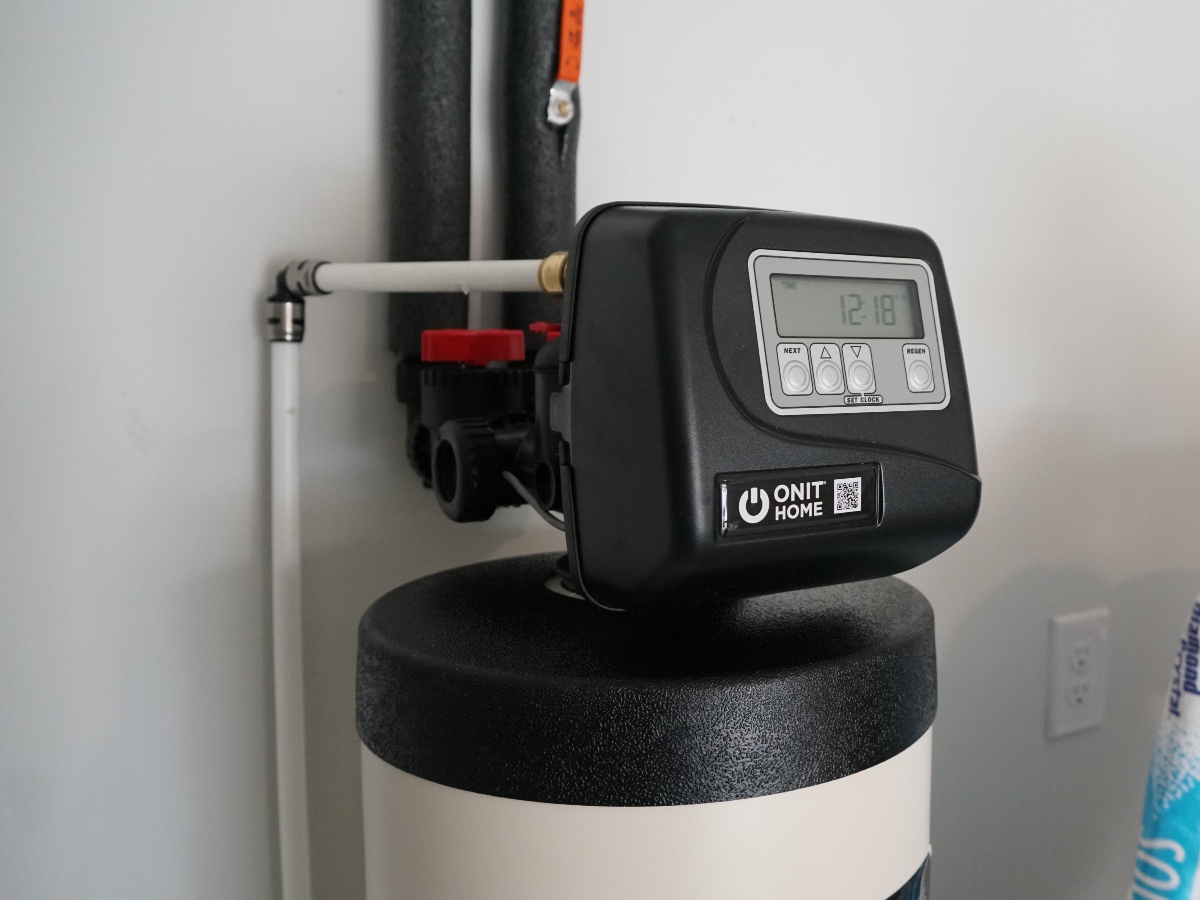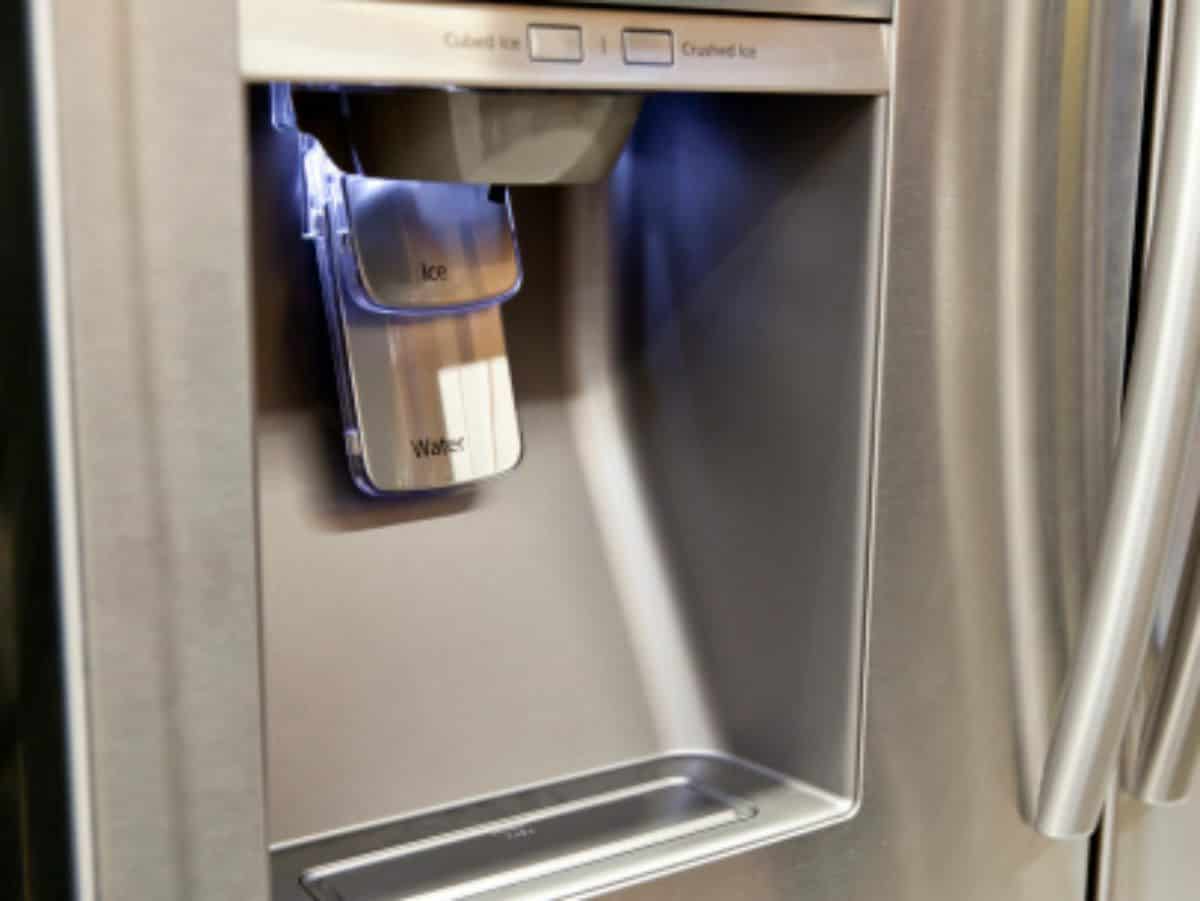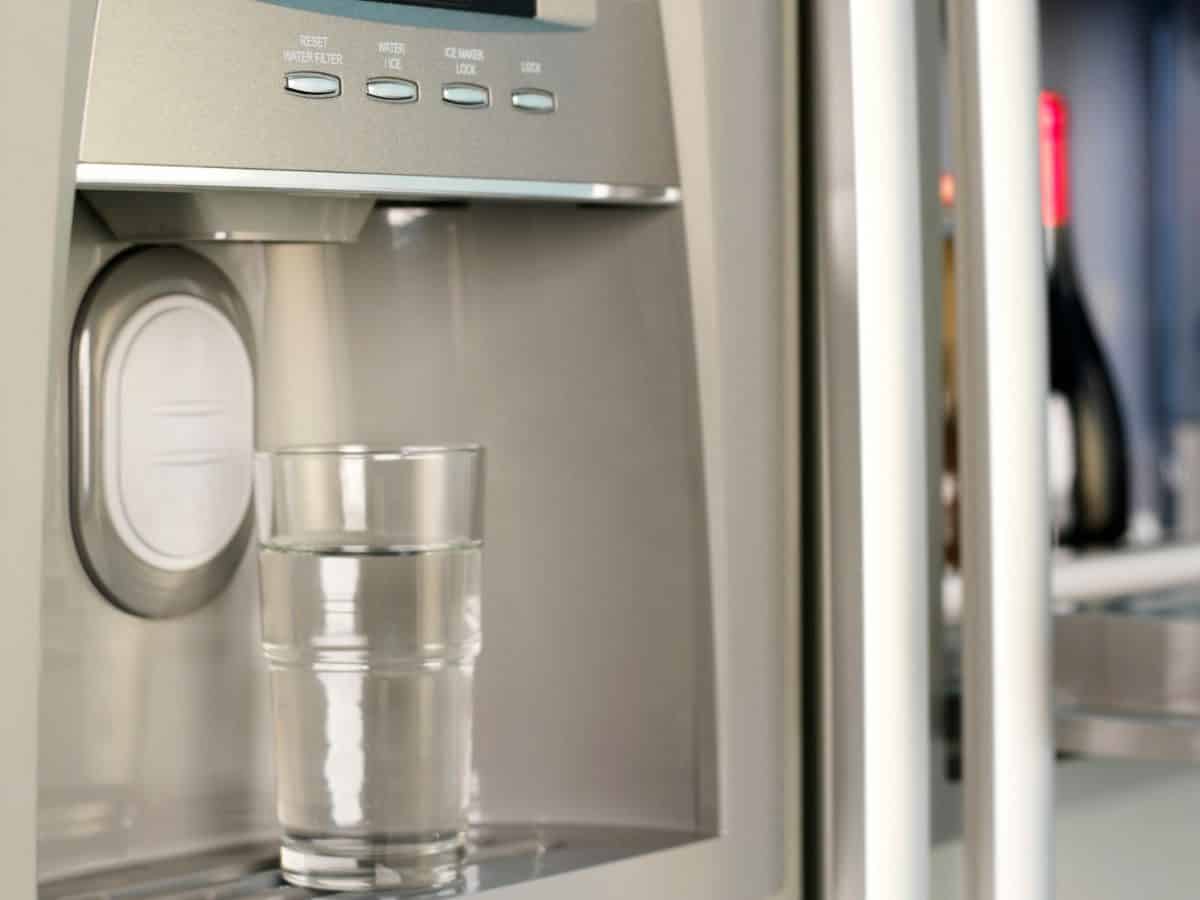Having crisp, clean, cold water pouring over easily dispensed ice is convenient. It’s vital to understand how to maintain your fridge water filtration to ensure your water remains safe. Learn how often to change refrigerator water filter. Plus, learn the basics of water filtration and how to reduce the stress of maintaining clean on-demand water.
What Kind of Filtration Does a Refrigerator Have?
Most fridges use a two-stage filtration cartridge. They are designed to filter what city water treatment might leave behind. These cartridges are usually easy to access for removal and simple to install when it’s time to swap them out. These cartridges use a simple filtration system that combines sediment and activated carbon filters.
- The sediment filter blocks larger particles from passing through it.
- An activated charcoal filter attracts chlorine (and some other chemicals) and converts it into salt which is then trapped within the filter.
- Clean water passes into your cup.

What Does a Fridge Filter Remove?
Refrigerator filters do not remove all contaminants. They focus on the most significant risks city water treatment can leave behind. Generally, fridge filters have a micron rating of only 20, so they can miss smaller particle contaminants that can pass into your water and cannot filter viruses and bacteria. They typically remove or reduce the following:
- Lead
- Chlorine
- VOCs
- Chloramine
So What’s a Good Micron Rating For a Filter?
The Micron rating tells you how small a particle needs to pass through the filter. The smaller the rating, the smaller the holes in the filter. A fridge filter typically has a micron rating of 20, which means it will still allow particles visible to the naked eye to pass through. You’ll want a filter rated 5 or lower to filter particles visible to the human eye. To remove bacteria and viruses, you’ll want one or smaller.
What’s the Risk from Unfiltered Contaminants?
If your filter stops working, what might the water contain? The contaminants no longer being filtered can wind up in your drinking water and potentially lead to various issues.
Lead
Frequently used in a range of products before 1986, lead is not uncommonly found in older pipes. The EPA recommends completely removing lead from water, as it’s highly toxic and can lead to many health issues, many of which are severe.
Chlorine
A great disinfectant that effectively removes waterborne disease, chlorine may be used to treat city water. If not properly filtered out, it leaves an awful taste behind.
VOCs
According to the EPA, about 20% of city water supplies contain VOCs. These chemicals come from many sources and can lead to a range of health issues, including liver and kidney damage, nausea, irritation of the eyes and throat, and headaches. They also contribute to foul odors and tastes in your water.
Chloramine
A product of some city water filtration processes, chloramine combines chlorine and ammonia. There are ongoing concerns about the safety of chloramines in our water.

How Long Does a Fridge Filter Last?
So how often to change refrigerator water filter to avoid it to ensure it continues to work well? You need to change out your refrigerator filter every six months. Sometimes, you might be able to wait as much as one year. However, if you wait too long, your filter will stop working and may put your family at risk. Can include:
- Harbor bacteria grow in the charcoal medium, which may pass into your water, potentially causing illness.
- Release contaminants into your water present in the water or previously stored in the filter.
- Clog the line – no more water emerges.
If you use a filter past its replacement date, your water may be contaminated with bacteria, viruses, chemicals, or other risks depending on the source of your water and what’s happening inside your depleted filter. Knowing how often to change refrigerator water filter and follow through on it is essential.
Helpful Tips to Help You Remember to Replace Fridge Filters
If you are relying on your fridge filter, it’s a good idea to set a reliable schedule to replace it before it’s clogged. These tips help you prepare to keep your fridge’s filter working as intended.
- Mark it on a calendar – digital or otherwise – a month before the filter must be replaced.
- Pair filter replacement with other routine bi-annual household tasks. Pairing this task with the one you are already used to doing twice a year will help you remember.
- Buy filters in bulk. When you get low, buy more. Having multiple filters on hand means that when it’s time to replace the old ones, there won’t be time for bacteria to develop.
- Set up an automatic water filter delivery. Some companies will allow you to set up an automatic shipping schedule for fridge filters. Not only does this keep you in the supply of fresh filters, but the new arrival will also remind you that it’s time to swap.
- Consider whole-house water filtration. You can ditch the fridge filters, remove more contaminants, and reduce upkeep with one of these.

So What’s a Whole House Water Filtration System?
A whole home water filtration system addresses your home’s unique water filtration needs and includes different levels of filtration to ensure only the best water emerges from your taps. It starts with a comprehensive water test to determine your needs. Then you’ll build a system to address your specific issues.
You may need whole home water filtration solutions like:
- A water softener – Reducing hard minerals that degrade your appliances and plumbing and dry out skin and hair.
- UV light purification – Neutralizes any threat from pathogenic microbes, meaning viruses and bacteria won’t infect your family through your drinking water.
- Comprehensive water filtration – To remove chemicals like bromine, chlorine, and heavy metals before it reaches your cup.
- Reverse osmosis – A final purification to remove even more contaminants from your water.
Common Questions About Whole Home Water Filtration
How Effective is a Whole Home Water Filtration System?
A whole home water filtration system removes 99% of all possible contaminants, including chemicals, viruses, particles, bacteria, and beyond.
Is it Hard to Maintain a Whole Home Water Filtration System?
ONIT Home’s whole-home water filtration systems are designed to be fully automated with low maintenance required. Say goodbye to worrying about how often to change refrigerator water filter! Instead, enjoy the long-lasting and low-maintenance option of a whole home water filtration system.
Does a Whole Home Water Filtration System Work For City Water?
Yes! While city water is pre-treated before it comes into your home, it may not be treated sufficiently to prevent all issues. A whole home filtration system ensures your family has reliably clean, tasty water at every tap.
Does a Whole Home Water Filtration System Work With Well Water?
A whole home system is excellent for a home using well water. Unlike city water, which gets pre-treated before it’s delivered to your home, well water’s filtration is entirely up to the homeowner. A whole home filtration system will protect your family from all the potential harmful issues well water can produce. Plus, it can eliminate hard water challenges, foul smells, and unpleasant tastes and preserve the life of your appliances and plumbing systems.

Are You Ready to Ditch Worrying About How Often to Change Refrigerator Water Filter? Call ONIT Home Today.
ONIT Home is ready to help you evolve your home’s water treatment. The process is easy! We offer a free water consultation. One of our technicians will test your water and help you understand the results. Then we will help you know which parts of our water filtration system will best serve the needs of your household.
We provide simple, affordable financing options to help you get set up with healthier water throughout your home. We can offer you a package that includes routine maintenance and service requests. When you are ready, our skilled technicians will install everything your home needs for fresh, clean water and ensure it’s in good working order. We stand behind our products and our technicians and offer a robust warranty so you can feel confident about our work.
When you are ready to get started, contact ONIT Home to get started with your free water test. Our friendly technicians are ready to help you understand how to address your water safety concerns. Call us today at 1-833-433-0331 to get started.



